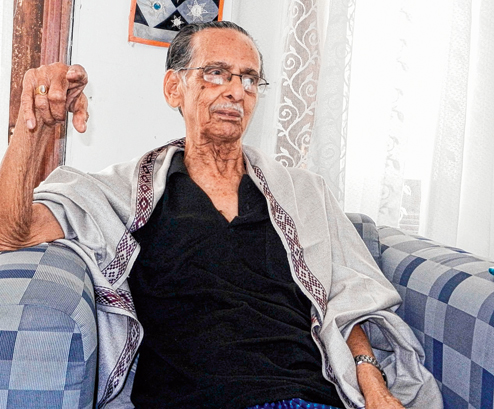 |
| Kavalam Narayana Panikkar |
Bhubaneswar, Nov. 28: An ardent follower of playwright Bhasa and Kalidas and one of the doyens of Indian theatre, Kavalam Narayana Panikkar, was in the city to attend the golden jubilee celebrations of the Utkal Sangeet Mahavidyalaya.
Performing art lovers had the opportunity to watch one of his productions based on Bhasa’s play, Karnabhara, which was staged today. Urubhangam will be staged tomorrow. Adapted from the Mahabharata, Karnabhara portrays Karna’s conflicts before entering the battlefield and Urubhangam describes the combat between Duryodhan and Bhima.
According to the theatre activist, Bhasa is above any other playwright ever born in the country. “His plays offer wonderful challenges to the modern Indian theatre directors. All those who are attracted to the western theatre should focus on reviving tales from the past and plays written by our ancient playwrights,” said Panikkar.
Human beings cannot exist without taking into consideration the achievements from the past, he said.
“A country like India often forgets the triumphs of its forefathers. One should definitely know what is there in one’s culture. Be it good or bad, it belongs to you. Plays based on our ancient times should be made in such a way that it becomes relevant to the modern society,” said the theatre activist.
Panikkar presents all the plays in Sanskrit, the language in which they were originally written, and believes that it will never be difficult for the audience to understand. “One has to present a play properly using the right movements and the body language along with music. Language can never be a barrier between audience and theatre,” he said.
Hailing from Kerala, the dramatist has written over 25 plays in Malayalam and has staged all the three plays of Kalidas. Panikkar’s latest production, Ritambhara, is based on a folktale from Bihar portraying Draupadi’s secret of her sixth husband.
The Padma Bhushan awardee has a special way of training the artistes of his troupe Sopanam. “Initially, the students are taught martial arts. It helps them to learn how to use and balance the body. This is followed by a voice training, which modulates their tone and teaches them to utter Sanskrit words properly. Thereafter, mental acting is imparted on how one can produce the rasa and bhava to play the roles,” said Panikkar.
Speaking on the future of theatre, Panikkar said: “A large number of youngsters these days are taking interest in plays. We have evolved a lot in dialogue rendering and action and I am extremely hopeful that it will keep flourishing.”










